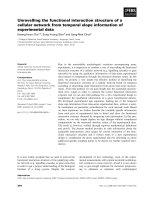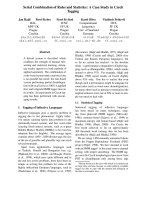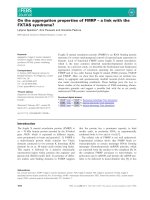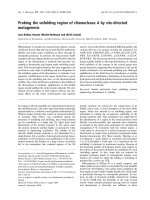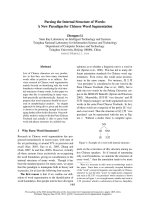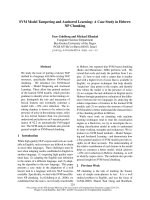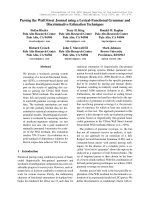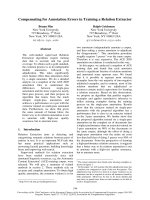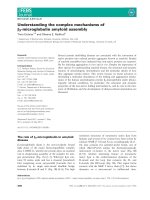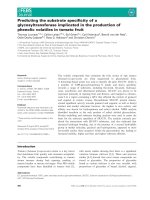Báo cáo khoa hoc:" Relearning the lesson – amelanotic malignant melanoma: a case report" potx
Bạn đang xem bản rút gọn của tài liệu. Xem và tải ngay bản đầy đủ của tài liệu tại đây (406.01 KB, 2 trang )
BioMed Central
Page 1 of 2
(page number not for citation purposes)
Journal of Medical Case Reports
Open Access
Case report
Relearning the lesson – amelanotic malignant melanoma: a case
report
Ezekiel Oburu* and Alberto Gregori
Address: Department of Orthopaedics, Hairmyres Hospital, East Kilbride, G75 8RG, UK
Email: Ezekiel Oburu* - ; Alberto Gregori -
* Corresponding author
Abstract
Although not as common as the other melanomas, amelanotic melanoma often evades diagnosis by
masquerading as other pathology. A high index of suspicion is therefore required for early and
appropriate intervention. We present a patient who was diagnosed and managed as having
paronychia of the middle finger while in actual fact he had a subungual amelanotic melanoma. By
the time of his referral to the orthopaedic team it had progressed to an advanced stage. Our case
underlies the importance of early recognition and referral of this rare but malignant lesion by
primary care physicians.
Background
With malignant melanoma early diagnosis is vital.
Amelanotic malignant melanoma often presents in unu-
sual ways, often evading early diagnosis, resulting in a
poorer prognosis. Differential diagnosis can include paro-
nychia, pyogenic granuloma, glomus tumor, and subun-
gual haematoma. Our case highlights that any persistent
ulcer adjacent or below the nail not responsive to treat-
ment should raise suspicion.
Case presentation
A 55 year old male presented with a 10 month old pain-
less ulcer of the left middle finger (Figure 1). Being a nail
biter the initial diagnosis was paronychia having dis-
charged pus. Nail removal was attempted and antibiotics
were administered. The wound was subsequently dressed
for months without improvement.
Examination revealed an ulcerated swollen fingertip with
partial nail loss.
Lymphadenopathy was not clinically evident. Haemato-
logical parameters were normal. Radiology revealed a dis-
tal phalangeal radiolucent lesion (Figure 2). An excision
biopsy diagnosed amelanotic melanoma with a Breslow
level of 6 mm. The patient later developed pulmonary
metastasis and died.
Discussion
Melanoma not only presents to dermatologists, but to
other medical practitioners and early diagnosis is vital.
Patients discover approximately half of melanomas, a
quarter are detected by medical providers [1]. Amelanotic
melanomas comprise only 2% of melanomas [2] and is
most commonly subungual [3].
Prognosis is dependant on the Breslows level at time of
diagnosis. In amelatonic melanoma the cues leading to
diagnosis are often absent, leading to reports of missed
diagnoses and poorer prognoses. Evaluating this patient's
presentation suggests that an earlier diagnosis was possi-
ble. Nail loss can occur in subungual melanoma and
Published: 31 January 2008
Journal of Medical Case Reports 2008, 2:31 doi:10.1186/1752-1947-2-31
Received: 29 March 2007
Accepted: 31 January 2008
This article is available from: />© 2008 Oburu and Gregori; licensee BioMed Central Ltd.
This is an Open Access article distributed under the terms of the Creative Commons Attribution License ( />),
which permits unrestricted use, distribution, and reproduction in any medium, provided the original work is properly cited.
Journal of Medical Case Reports 2008, 2:31 />Page 2 of 2
(page number not for citation purposes)
lesions affecting the nail bed associated with nail plate lift-
ing are suspicious [4]. Lack of ulcer healing is another sign
suggestive of underlying malignancy. The radiological
appearance was also suggestive of malignancy. Elmets [5]
reported a sixty-two year old man with a right hallux
amelanotic melanoma diagnosed after the lesion had
been treated for months as a pyogenic granuloma. Estab-
lishment of the correct diagnosis was aided by finding a
radiolucent defect on radiology.
Underlying bone involvement and a Breslow level of 6
mm is confirmation of a late diagnosis. In reviewing 24
patients with subungual melanoma Rigby [6] found a
mean diagnostic delay of 30 months. The timing of diag-
nosis is critical with better survival rates in cases of early
diagnosis and treatment.
Non healing ulcers distorting the digital nail bed should
engender a high index of suspicion of malignancy and
demand radiology and early biopsy [7].
Conclusion
This case report emphasizes the importance of early diag-
nosis of amelanotic melanoma and the need for a high
index of suspicion on the part of the primary care physi-
cian. Non healing ulcers adjacent to the nail bed should
be investigated by early biopsy and radiology.
Competing interests
The author(s) declare that they have no competing inter-
ests.
Authors' contributions
EO (SHO) managed the patient and wrote the report. AG
(Consultant) performed surgery and supervised and
edited the report. Both authors read and approved the
final manuscript.
Acknowledgements
The authors would like to thank the medical illustration department of
Hairmyres Hospital for providing the photographs. Written consent was
obtained from the patient's relative for the publication of this report.
References
1. Koh HK, Miller DR, Geller AC, Clapp RW, Mercer MB, Lew RA:
Who discovers melanoma? Patterns from a population-
based survey. J Am Acad Dermatol 1992, 26:914-919.
2. Conrad N, Jackson B, Goldberg L: Amelanotic lentigo maligna
melanoma: a uniquecase presentation. Dermatol Surg 1999,
25:408-11.
3. Abeldaño A, Saadi M, Brea P, Kien M, Chouela E: Amelanotic Len-
tigo Maligna Melanoma. SKINmed 2004, 3:41-44.
4. Harrington P, O'Kelly A, Trail IA, Freemont AJ: Amelanotic subun-
gual melanoma mimicking pyogenic granuloma in the hand.
J R Coll Surg Edinb 2002, 47:638-640.
5. Elmets CA, Ceilley RI: Amelanotic melanoma presenting as a
pyogenic granuloma. Cutis 1980, 25:164-6. 168
6. Rigby HS, Briggs JC: Subungual melanoma: a clinicopathologic
study of 24 cases. Br J Plast Surg 1992, 45:275-278.
7. Adler MJ, White CR Jr: Amelanotic malignant melanoma. Sem-
inars in Cutaneous Medicine & Surgery 1997, 16:122-30.
Figure 2
Figure 1
